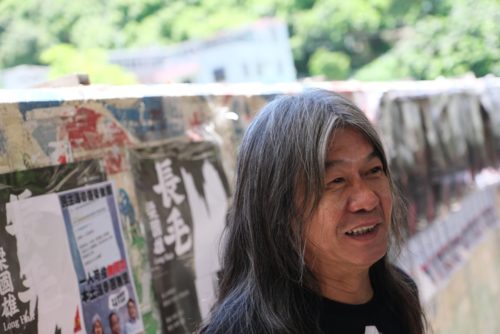Hong Kong student challenges school dress code that bans long hair for boys
A rare display of defiance against gendered dress codes in Hong Kong schools.

Last month, a Hong Kong teen surnamed Lam took to social media to speak out against her school’s requirement for boys to have short hair. The resulting debate over dress codes and gender expression went mainstream and unleashed a legislative dispute.
“I like myself with long hair. It suits me better,” Lam, a high school student at Tung Wah Group of Hospitals Wong Fut Nam College, told The China Project. Lam’s preferred pronoun is she/her. In a video uploaded to Instagram on July 19, she said that the long hair ban negatively triggered her “gender dysphoria,” a medical term used to describe the feeling of discomfort or distress caused by inconsistency between gender identity and sex assigned at birth.
Despite her desire to dress freely, Lam alleged that she was told by school officials to cut her hair if she wanted to attend school activities. “I want to take this opportunity to facilitate the discussion about the unreasonable constraints on boys’ hair length,” she said, adding that she had lodged a complaint with the Hong Kong Equal Opportunities Commission (EOC) against her school for breaking the Sex Discrimination Ordinance.
Hairstyle restrictions are nothing new to Hong Kong students, with most schools imposing stringent dress codes requiring a certain type of haircut for different genders. Typical attire guidelines enforced in secondary schools stipulate that although short hair is recommended for all students, female students are given the option to have long hair beyond their shoulders as long as it’s tied up with hair bands. Boys’ hair, however, must be kept trimmed above their ears, eyebrows, and shirt collars.
As a rare act of defiance against the long-held tradition, Lam’s video quickly went viral online, attracting more than 683,000 views so far on Instagram. Her message struck a chord with a lot of people, including celebrities like Serrini Leung Ka-yan (梁嘉茵 Liáng Jiāyīn), a Hong Kong singer-songwriter. “It all starts somewhere,” she wrote in support of Lam.
Others defended the current policy. In an interview with Commercial Radio Hong Kong, Tang Fei (鄧飛 Dèng Fēi), vice chairman of the pro-establishment Hong Kong Federation of Education Worker, said that because boys sweat more, “they should keep their hair short.” Tang, who is also a lawmaker, went on to say that male and female students should be treated differently “to some extent” because of their different mental and physical aptitudes.
But Lam found Tang’s argument unconvincing. “Boys and girls both sweat. Should some girls be forced to cut their hair because they sweat more?” she wrote on social media. “We need the freedom to choose our hair length instead of being forced to keep it short or long.”
Lam also cited the significant case of social activist and former pro-democracy legislator Leung Kwok-hung (梁國雄 Liáng Guó Xióng) as a source of inspiration and motivation for her complaint. Widely known by his nickname “Long Hair,” Leung was forced to chop his trademark locks when serving a jail sentence over a protest in 2014. The politician then embarked on a lengthy legal battle against the Correctional Services Department (CSD), accusing it of treating male and female prisoners unfairly in their right to haircuts.

While the city’s top court ruled in Leung’s favor in 2020, deciding that compulsory haircuts only for male prisoners are equivalent to sexual discrimination, his victory led to an unwanted result: Local media reported that the CSD reformed the standards to require female prisoners to have short hair too.
The anti-discrimination ordinances in Hong Kong currently cover four categories, namely sex, race, disability, and family status. The legislative effort to include sexual orientation and gender identity yielded little result, though related discussion started in the 1990s.
The laws function as critical guidelines in various fields, including education. According to the School Administration Guide issued by education authorities in Hong Kong, schools should design attire codes in reference to the Racial Equality and School Uniform guide created by EOC in 2014, which encourages dress rules to be inclusive to avoid gender stereotypes and be evenly applied to both boys and girls.
Although Lam criticized the current dress codes for overlooking the needs of gender minority students, she didn’t think that new laws against gender identity discrimination would solve the problem. “If such laws get passed, the school will ask me to provide medical proof and alarm my parents. I don’t want my fellow students to have to come out just because they want to wear long hair,” Lam told The China Project.
“I think we should take students’ needs seriously,” Vinci Wong Yin-Chi (王賢誌 Wáng Xián Zhì), the 2018-19 chairman of the board of directors at Lam’s school, told The China Project. Wong, who is also an actor and a TV host, revealed that he had passed Lam’s opinions to relevant parties. “It’s a learning process for students to abide by the rules at school, but the regulations can also be loosened in certain cases.”
Wong, who came out in 2013, agreed that the attire policy could be discussed and reviewed, but adjustments need to be “a step-by-step process instead of an overnight revolution.”
“I also want to fight for more rights for the LGBTQ community, but it can’t be changed within one day,” he added. “We may start by relaxing hair restrictions individually, then gradually altering general rules.”
Ivy Wong Wang(黃泓 Huáng Hóng), an associate professor in the Gender Studies Program at the Chinese University of Hong Kong, told The China Project that Lam’s experience is indicative of widespread gender stereotypes in Hong Kong’s society. “Apart from appearance, gender-based stereotypes in other domains, such as abilities, occupations, and personalities, abound in schools and families,” Ivy Wong said. “Teachers and peers may inadvertently make comments and give different treatments based on gender. Such behavior can result in undesired outcomes.”
She also emphasized that the restrictions on hair and other methods of gender expression could bring significant stress to people whose gender identities are at odds with their birth sex. She urged schools and the education bureau, together with society, to take a more active role in acknowledging and raising awareness about gender-related issues.
For Lam, although her complaint has passed the EOC’s assessment, chances remain low that her case will spark a legal change. According to EOC’s procedures, only after the failure of early conciliation, an investigation, and the final conciliation will the committee help the complainant apply for legal assistance.
The first round of conciliation was initially scheduled for August 10, but the meeting was postponed, as the school said that it needed more legal advice. Lam told The China Project that a new date has not been announced, and that she would not rule out further legal actions.
Lam also disclosed that a few students had told her that their schools were considering easing the hair length restrictions for boys, and her case would be one of the most prominent references. “I am optimistic about the outcomes, otherwise I would not feel motivated to keep going,” she said.





